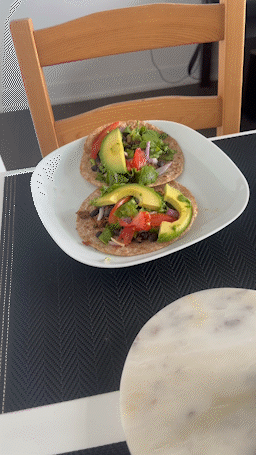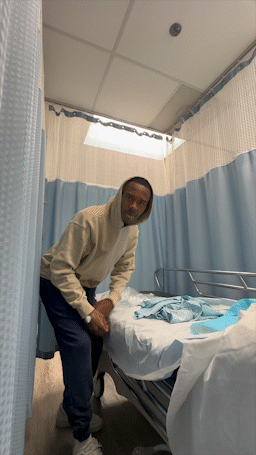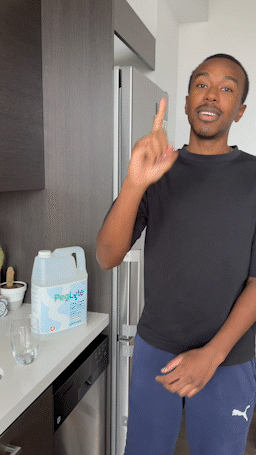- Money Convos with Steph & Den
- Posts
- Why We're Not Buying Life Insurance (For Now...) 😬
Why We're Not Buying Life Insurance (For Now...) 😬
181 days down, 183 days left to go! That means that we’re pretty much halfway through 2024 (crazy!), and time’s just going to keep flying from this point on.
We’re back with another issue of Money Convos with Steph & Den, and we have some fun updates, along with some useful money tips, for you this month.
Here’s what’s up in this copy 🤑🗞
Why we aren’t getting life insurance (for now) 👀
Steph’s ½ done the $0 UberEats challenge! 🍔
We have something exciting coming soon… 🤫
It’s time for a mid-year money check-in 💰🔍
Money Convo Of The Month
Why We Aren’t Getting Life Insurance (for now, at least!)

I don’t know about you, but we’ve been thinking about life insurance for years - we’ve heard people talk about why you need it, why you should get it while you’re young, and on top of that - because of what we do - we’re constantly being asked ‘is life insurance something that I need?’.
Well, we had the same question, and - after doing some research - our conclusion is… no. Let me explain.
Life insurance is meant to serve a very specific need - it provides income to your dependents, if you die, while they’re still financially dependent on you. Your dependents could be your spouse, your kids, or anyone who relies on you to provide (think: if you and your spouse rely on your income alone, and you die, they wouldn’t have any money to pay for life’s essentials, for example).
For the majority of people, that’s the only reason you might need life insurance. So, if you’re wondering if you need life insurance right now, the first question you should ask yourself is ‘does anyone rely on me financially?’ If the answer is no (like it is for me and Steph), then you likely don’t need life insurance. If the answer is yes, then you might want to consider getting life insurance.
Now, that brings us to the next logical question - what type of life insurance should you get? Even though we currently don’t need life insurance, we’ll likely have dependents (and mortgage debt) one day, so this question is still relevant to us, too!
To keep things simple - there are two main types of life insurance: term life insurance, and permanent (aka whole) life insurance. Term life insurance, like the name suggests, covers you for a specific period of time (or a term). This could be 10 or 20 years, for example. Whole life insurance works a little bit differently, as it covers you for your entire life.
So… which one should you get? Well, for many people, term life insurance makes the most sense for a few reasons. Like we mentioned, you likely only need life insurance to cover your dependents if you were to die, and, most of the time, your dependents won’t be dependent on you forever (your kids will grow up and be able to provide for themselves, for example). Now, this may not be the case for everyone, so make sure you look into the best option for your personal situation, but most of the time life insurance is only going to be needed for a set period of time, making term life insurance a great fit.
The other reason term life insurance is often preferable is because of the ‘dangers’ of whole life insurance. That might sound dramatic, but, at the end of the day, insurance - just like many other products in the financial services industry - is something that makes providers and insurance companies a lot of money, and they want to profit off of you. Whole life insurance (although it can be a valid product in some select situations) is one way to do this, because there’s a lot of money to be made by selling you a policy that covers you for your entire life - you end up making payments for a much longer period of time (even if the monthly amount is lower, the overall amount is often much higher than term life policies).
TLDR? We don’t plan on getting life insurance until we have dependents (aka kids), and when we do, we’ll be looking into term life insurance.
If you want to hear more about life insurance overall, and the other things you should look out for when it comes to whole life insurance specifically, check out our recent YouTube video here.
$0 UberEats Challenge - Steph’s Monthly Update
We’re officially halfway through 2024, which means that I’m officially halfway through this challenge, too!
I think it’s safe to say that by this point in the year, I’m really dedicated to spending $0 on UberEats - or takeout of any kind - until we hit December 31st. Honestly (and I may be getting ahead of myself here) I feel like this may be a challenge that I’ll keep up as long as I live in a city where restaurants, and the grocery store, are only a short walk away… but more on that in a future month.
This month I didn’t spend any money on takeout, and I was under my $150 restaurant budget, spending exactly $148.84 on eating out in person. The highlights were walking to pick up pizza from our new favourite spot in the city, and a Sunday morning brunch date. I also spent $50 at coffee shops (if you’re in Toronto, Brodflour has become a new favourite for us!).
I also spent a total of $313.70 on groceries in June, which is slightly over my $300 budget. This is actually still my second lowest grocery spend month of the year (I spent closer to $380/month from January to April), so I’m very happy with the result.
Now, my secondary goal of cooking one new recipe every week definitely took a hit this month. It was our busiest month of the year (so far), and, although we still cooked at home almost every day, I didn’t take the time to find new recipes to make. That’ll be my main focus for July - I’ll keep you posted next month!
 |  |
Health Is Wealth 🩺 💰
For us, June was a month full of health appointments - Steph’s getting her tonsils out later this year (more to come on that), and Dennis got a colonoscopy for the first time.
Now, we’re bringing this up for two reasons -
If you’ve been putting off anything health related - now’s the time to stop! Go get yourself checked out and taken care of. Not only is it better for your health, and your peace of mind, but if there is anything wrong, it’s better for you and your wallet to take care of it sooner rather than later.
We live in Toronto, Canada, and appointments like colonoscopies are (thankfully) covered by our public healthcare system, but we still asked for the bill so we could share the cost breakdown.
The total cost of the colonoscopy itself was $381.80, and the prep materials cost $46.31. If you want to see a full breakdown of the cost, and an overview of the process, check out this video that we shared.
 |  |
Coming Soon… Simple Investing 👀
Last month we left you on a bit of a cliff hanger by mentioning that we had a very exciting announcement coming soon… Well, it’s time to share!
For the past few months, we’ve been working on an investment course that will cover everything you need to know in order to start investing in the stock market (or, if you’ve already started investing, figure out if you’re investing in the ‘right’ way).
It’s called Simple Investing For Canadians (if you’re reading this and you’re not Canadian, don’t worry - we’ll have something for you in the future, too!).
We’re still working on the finishing touches, but we have a waitlist on our website that you can sign up for if you’re interested.
Stay tuned for further updates - we’re so excited!

Mid-Year Money Check In 🤓
In case you didn’t see us mention it earlier, we’re halfway through 2024, and that means that it’s time for a mid-year money check-in.
Ideally, you’re reviewing what’s going on with your money every month (when you update your budget!), but, if you’ve fallen behind, now’s a perfect time to get yourself up-to-date. Or, if you are on top of your game, it’s still a great opportunity to do some deep cleaning, too.
Here are a few ideas to add to your mid-year money check in list -
Update your budget - Are your budget categories still accurate? Are you consistently spending more (or less!) in one area, and should you change your budgeted amount?
Track your spending - How much have you spent overall for the first six months of the year? Does it align with how much you planned on spending? If the results aren’t what you’d hoped for, that’s okay - this exercise helps you adjust moving forward!
Review your money goals - Do you remember what your 2024 financial goals were? How are you tracking against them? Are there any goals that you want to add, or scratch off, the list?
Rearrange your accounts - Do you have any excess money building up in your bank account that you could transfer to your savings, or investments, instead? Is your emergency fund still full?
Debt & credit health check - Do you have any outstanding debt? If yes, review your outstanding balances, current interest rates and payment plans. Also, when’s the last time you checked in on your credit score? If it’s been a while, grab a free credit report and review.
We know that the next six months of the year are going to fly by, so make sure you take some time for your mid-year money check in now, and set yourself up for success!
That’s it for now! We’ll see you next month. 👋🏿 👋🏻

P.S. You can catch up with us on Instagram and YouTube
Was this forwarded to you? Sign up here
Have a question for us? Submit it here
